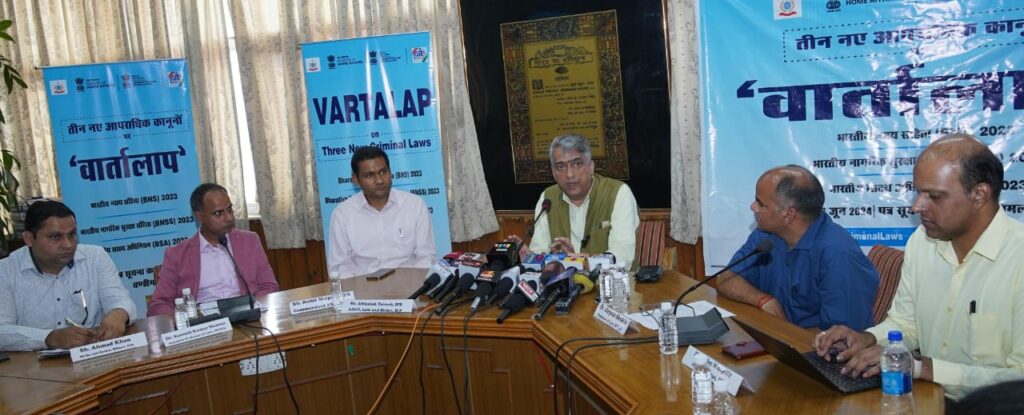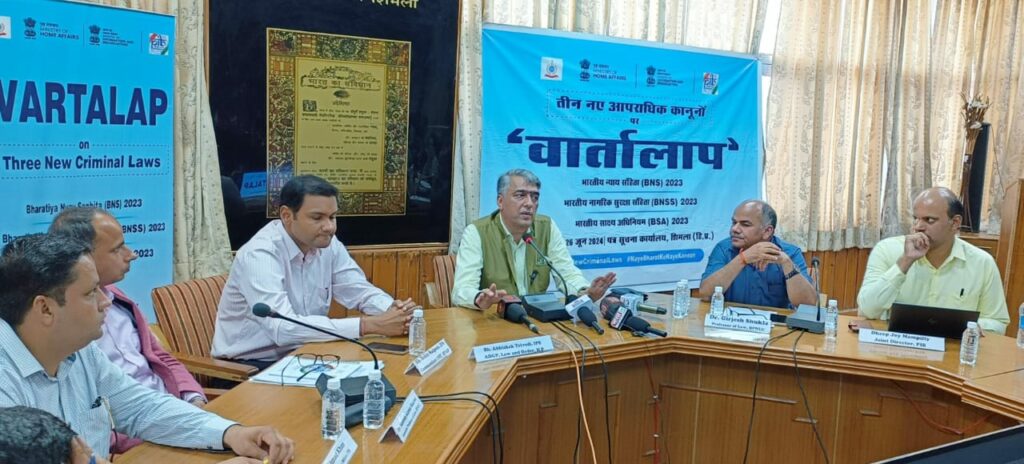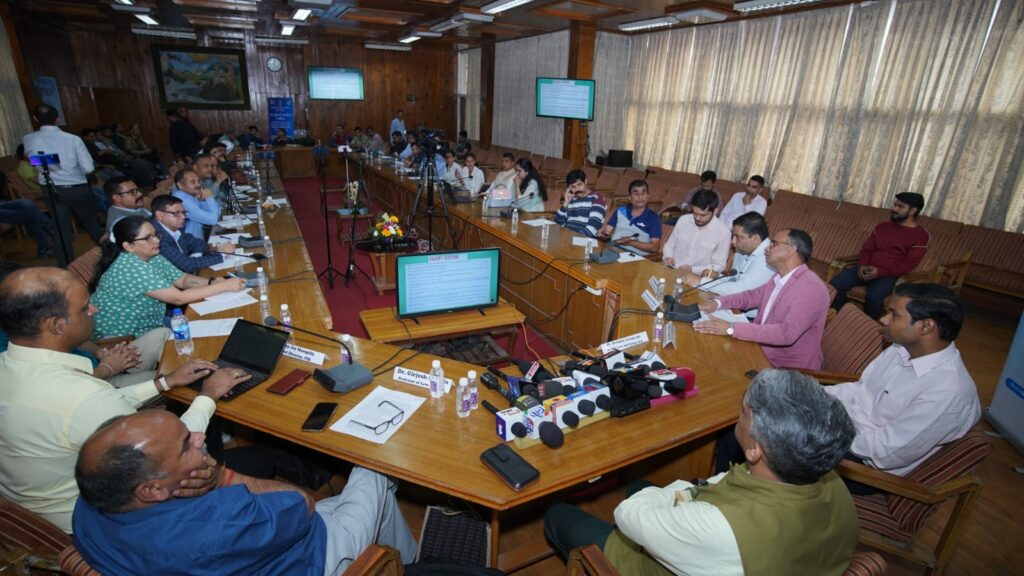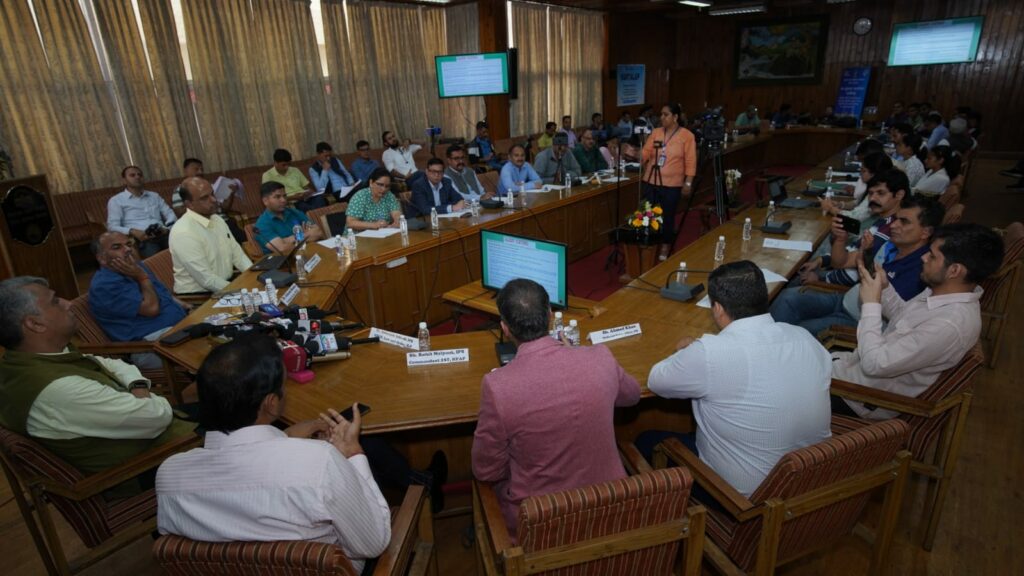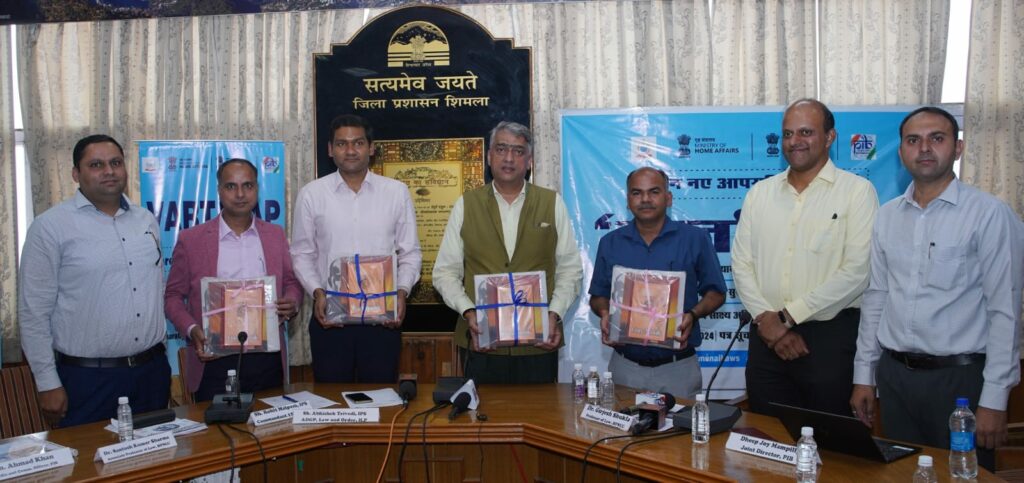
What is going to change with the implementation of the three new criminal laws, namely, The Bharatiya Nagarik Suraksha Sanhita, 2023, The Bharatiya Nyaya Sanhita, 2023 and The Bharatiya Sakshya Adhiniyam, 2023? What are the key features of these legislations and what do they aim to achieve?
The Press Information Bureau (PIB), under the Ministry of Information and Broadcasting, Government of India organized a Vartalap in Shimla today, June 26, 2024, to familiarize the media about the provisions of the three new laws, which are set to come into force in a few days from now, from July 1, 2024. The Chief Guest for the occasion was Additional Director General of Police, Law and Order, Himachal Pradesh, Abhishek Trivedi. Commandant, 1st HPAP Battalion Junga, Shimla, Rohit Malpani; Professor of Law, HP National Law University, Shimla, Prof. (Dr.) Girjesh Shukla; and Associate Professor of Law, HP National Law University, Shimla, Dr. Santosh Kumar Sharma are the other subject-matter experts who addressed the media.
The Chief Guest and Additional Director General of Police, Law and Order, Himachal Pradesh, Abhishek Trivedi said that all cases registered since the stroke of midnight hour ushering in July 1st, 2024 will be tried as per the new criminal laws.
He informed that the preparation for moving to the new system has been going on in full swing. “Training of all officials, at all levels, is being done and will be completed soon. Judicial officers, forensic officers, prison officials – whoever is involved in administration of criminal justice – needs training. We made master trainers, and then master trainers at every police station. Advanced-level training is being given to officials of rank head constable and above.”
New laws introduce many changes in line with the needs of the times
Stating that many changes have been introduced as per the needs of the changing times, the ADGP said that technology has been given a lot of force under the new laws. “The new laws will bring uniformity across the nation in filing of e-FIRs. The thrust is on mobile phones and applications. Any seizure will now have to be accompanied with videography,” he said. He pointed out that the police as well as others will have to work harder and become more technology-friendly, which he mentioned as a very big learning opportunity.
The ADGP said that in many countries, there is a regular review of laws, and that the new laws are very welcome in this regard.
NCRB’s Sankalan App provides correspondence between old and new laws
The ADGP informed that National Crime Records Bureau has made a free app called Sankalan, which provides information on old sections in Indian Penal Code, Code of Criminal Procedure and Indian Evidence Act and their corresponding new sections under the respective new criminal law.
Speaking about the importance of public awareness, the ADGP said that every person is impacted by this, everyone should learn about the laws and spread awareness. “Bureau of Police Research and Development has made videos available. The impact of this is big and will be seen in some years to come. It was very necessary,” he said.
The ADGP said that the entire criminal justice system and the society as a whole will benefit from the new laws. It will make the system transparent, strong and effective. The new laws embody a reformative philosophy, not retributive philosophy. He added that the government has addressed criticisms and made changes to the laws keeping these in mind.
Basic purpose of new laws is to provide justice, not punishment
Echoing the words of the ADGP, Commandant, 1st HPAP Battalion Junga, Shimla, Rohit Malpani said that the basic purpose of the new laws is to provide justice, not punishment where justice includes victims, the accused and society, including women and children. He said that while provisions for e-FIR and zero-FIR have been there already, these have been formalized under the new law, thereby eliminating grey areas. “Now, no officer can deny that the offence has occurred elsewhere and hence that FIR cannot be registered in his or her police station,” he said.
The Commandant said that the provision of videography of search and seizure operations in the new law enables police officers to recall what exactly transpired in old cases investigated by them, and also makes evidence better-appreciated, when the same is presented in the court. The hash value enables authentication of video evidence and the police welcomes provisions such as these with a whole heart, he added.
New sections added for organized crime, mob lynching
The Commandant informed that organized crime, instances of which have been increasing especially in border districts, used to be registered as murder, robbery or dacoity, but that now a new section has been introduced. “Earlier, there was no option to provide diluted punishment, but we have a section for petty offences which permit this. And community service has been added for graded punishment.”
The officer informed about other changes introduced by the new laws. “The act of hiring children to commit an offence was a grey area earlier, but a section has been added for that now. Offence of mob lynching has been added. Punishment for causing death by rash or negligent act has been increased. Domain of theft has been expanded.”
Even WhatsApp messages will be admissible as evidence
Informing that electronic and digital records have been included in the definition of ‘Document’, the officer informed that this will cover WhatsApp and SMS messages as well. “The police will have to maintain record of this and this will be admitted as primary evidence. Earlier, the provisions were there in IT Act but not under IPC.”
The officer informed that as per the new laws, permission of DSP or above would be required for arrest of persons who are infirm of above 60 years of age, in cases with less than 3 years of punishment.
Rohit Malpani informed that BNSS provides clear-cut provisions on use of handcuffs – when and how and on whom to use, depending on factors including nature of gravity of offence, and whether the person is running from custody, or has committed certain sensitive crimes.
He added that the new law provides clear provision for submission of evidence and that clarity has brought in as regards declaration of proclaimed offender.
Professor of Law, HP National Law University, Shimla, Prof. (Dr.) Girjesh Shukla said that the Code of Criminal Procedure was failing in some way due to procedural delays due to factors such as adjournments, multiplicity of courts and others. Bharatiya Nagarik Suraksha Sanhita (BNSS), 2023 has addressed these to a significant extent. “One, at the level of courts, whether metro or non-metro, there will be one name. Quantum of punishment has been increased and range of petty offences has been increased. The revised threshold for petty offences will reduce the burden on the judicial system.” The courts have thus been streamlined, said the professor.
The second approach, added the Professor, has been the use of technology in various legal proceedings, such as serving summons, notices, and warrants electronically, and Videography of Search and Seizure Operations. “This has strengthened courts and the judicial process and system.”
The Professor informed that BNSS mandates forensic teams to visit the crime scene to collect evidence for offences punishable by imprisonment of seven years or more, which he said is a very important move towards strengthening the investigation process. He informed that the BNSS also provides for protection of vulnerable witnesses, by providing safeguards such as videoconferencing for recording statements and protection of witnesses’ identities.
Prof. Shukla highlighted other changes introduced by the new laws. “The bail procedure has been streamlined. It allows trial in absentia for proclaimed offenders. Adopting a gender perspective, the law provides that summons can be served to an adult family member, not just male member.”
He informed that victim’s rights have been expanded. “Under the new system, victim has to give statement about progress of investigation, which can be done through digital means. Hearing of victim will be necessary before the government withdraws the case; one-sided withdrawal is not possible now. And witness protection scheme has been formalized.”
He also added that the scope for interpretation has been significantly minimized under the new laws, for instance, by clearly specifying who is proclaimed offender.
Speaking about the The Bharatiya Nyaya Sanhita, 2023, Associate Professor of Law, HP National Law University, Shimla, Dr. Santosh Kumar Sharma said that name of the law has been changed from Dhand Samhita to Nyaya Samhita since there is a shift of focus. “The purpose is that all functionaries should have the focus on delivery of justice, rather than on dispensing punishment. This is the primary purpose of the change in nomenclature.”
Voice of victim given due place
He said that another good change in the new law is that there are 83 sections where the fine has been increased. “This has been done from the perspective that the voice of the victim too is given due place. Death penalty has been provided for 13 offences while under IPC, this was only for 8 offences. Chapters relating to offences against women and children have been given priority and consolidated in one chapter.”
The Professor informed that there is now an intelligible classification for dealing effectively with crimes against women and children. “A new section has been introduced, dealing separately with rape and sexual intercourse. A section on sexual intercourse in the pretext of marriage or false promises has been included.”
He opined that the introduction of community service as a new punishment is very welcome, and that the judge can prescribe this for six types of offences. Attempt to commit suicide has been included, he added.
He informed that abetment from outside India has now been made an offence, which addresses situations such as those of the 26/11 Mumbai terror attack.
The new laws have addressed issues of technology integration very well. Some safeguards have been given for senior citizens, which are very positive and futuristic. The laws have given a wide provision for terrorist acts, which is the need of the hour.
Earlier, while welcoming the Vartalap participants, Joint Director, PIB Chandigarh, Dheep Joy Mampilly, gave an overview of the structure and system of central government communication, as reflected in the functions and activities of the departments under the Ministry of Information and Broadcasting, Government of India. Media & Communication Officer, PIB Chandigarh, Ahmad Khan delivered the Vote of Thanks.
The Vartalap in Shimla is part of a series of media workshops being organized by PIB across the country, as part of its effort to improve the understanding and appreciation of the new criminal laws among the media and in turn the general public.
